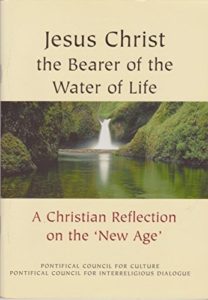Walk into any bookstore and you will find a section on Self-Improvement. Or just google search Self-Improvement and there are many websites offering advice. One of the first books I read was Dale Carnegie’s ‘How to make friends and influence people’. The tips were innocuous. I still recall to this day the tip on the importance of not only remembering names of people you meet but to also use them in greeting and in conversation. Dale Carnegie said “A person’s name is to that person, the sweetest, most important sound in any language.” So the normal –‘Hi! How’s it going?’ – is CMI (can’t make it). It has to be ‘Hi Selena! How’s it going?’.
Today’s self-improvement books and websites are, however, a different kettle of fish. The best sellers like ‘Think and Grow Rich’, ‘The Secret’ and ‘The Law of Attraction’ and many more are fraught with tips; tips on how to succeed in life but they are no longer innocuous.
A Catholic reflection on the ‘New Age’ by the Vatican’s Pontifical Council for Culture and Council for Inter-religious Dialogue, entitled ‘Jesus Christ The Bearer of the Water of Life’, is a major document detailing what Church leaders perceive as occult-like and even dangerous practices that have become common – from psychic phenomena to methods of healing and meditation – https://tinyurl.com/bearerofwateroflife

In the document, it states that the success of New Age offers the Church a challenge. People feel the Christian religion no longer offers them – or perhaps never gave them – something they really need. The search which often leads people to the New Age is a genuine yearning: for a deeper spirituality, for something which will touch their hearts, and for a way of making sense of a confusing and often alienating world.
Harmless or Evil?
So how do we as Christians discern if these self-help ideas are harmless or evil? How do we NOT fall prey to Satan who was able to convince Adam and Eve that they could be like God? Ken Yasinski of https://catholicspeaker.com offers some insight. It is in the messaging. Discern the messaging.
#01: You become your own saviour.
Visualise your success. Take charge of your life. Sounds motivational and inspirational, doesn’t it? There is nothing wrong in trying to get ahead in life or gain excellence in business but one must become fully aware of the personal motives behind this desire. Has materialism crept into your life?
Consider this: “For what shall it profit a man, if he shall gain the whole world and lose his soul?” Mark 8:36.
And what about salvation? No amount of positive thinking, or personal development can save you from the consequences of sin. No one can save us from sin but Jesus.
#02: Life is all about you.
Motivational speaker and author Zig Zigglar says, “You can get everything you want in life, if you just help enough other people get what they want in life.” In the workplace or even at home, we undoubtedly need teamwork and good communication skills. The problem is life is not about getting what we want. Life is also not about using people as a means to fulfilling our will.
Jesus didn’t serve people in order to gain something from them. His life was purely about the service of God the Father. And so it is with the Christian life. The Christian life is about living with Jesus at the centre, and not self.
#03: These books never ask the question: What does God want?
Some self-help books offer good advice but once they begin to dip into how you can harness power from the universe, or that you can attract the good into your life, or that there is no good or evil, just bad choices. Red flags should come up.
Jesus taught us to pray, “Let thy will be done”, not “let my will be done.” In the end, we will not be judged on how well we lived our own will, but if we were faithful to the will of God the Father. As Christians, we certainly don’t wish to miss out on the purpose of life, which is to do the will of God and glorify Him.
So should we shun these self-help ideas?
They can supplement our reading but should not be a substitute for reading scripture, the lives of the saints, and studying the Catechism of the Catholic Church.
If you feel there is a contradiction in what you are reading, seek clarification with your Catholic mentor or priest because the default position is to submit to what God has revealed to us to be true.
Karen Roberts-Fong

